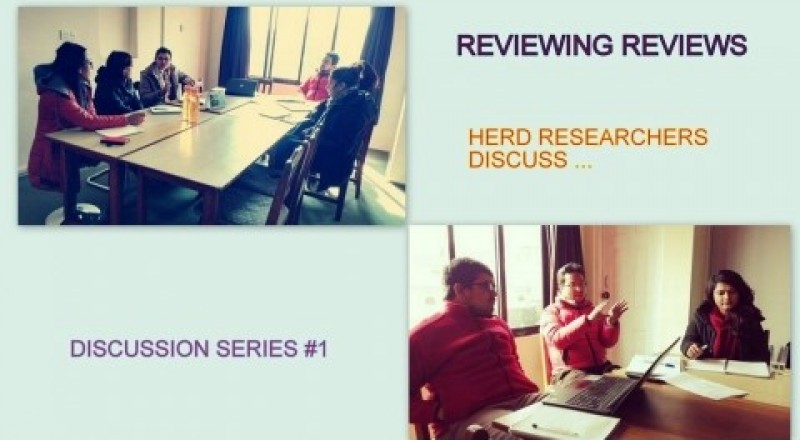A review is generally an account of what has been published on a topic. Reviews could be of various types such as scoping review, literature review, evidence review, policy review, systematic review, document review, among others. HERD researchers have been conducting such reviews while implementing projects of various nature and scale. A round table discussion was organized on January 22, 2016 to reflect upon our practice.
Understanding a Review
Uden Maharjan, Project Coordinator for Urban Health begins his understanding of review as a systematic process of exploring what’s there and what’s not there about a subject matter relevant to the study we are conducting. He added, “At earlier times, researchers had to ‘physically be there’ even for obtaining baseline/preliminary information but now that’s not the case. There are lots of online platforms/sources from where a desk review could make our lives much easier.”
Shophika Regmi, Project Manager - Monitoring and Evaluation of Nepal Family Planning Project agrees to Uden’s view as she opines, “Nowadays, with many research agencies, there is a large body of work already conducted in the same area/subject matter. Therefore, an evidence review, desk review, scoping review or such reviews could be smarter ways of avoiding duplication as well as streamline/narrow down the scope of work and make the study more focused and peculiar.”
Synthesizing Evidence
Rekha Khatri, Manager – Qualitative Research picks up an important issue of synthesizing evidence effectively by referring to the broad aim and objectives/research questions of the study all the time to identify whether the content of the readings are really relevant for further analysis of our review. Agreeing to this argument, Shophika Regmi adds that to avoid huge chunk of irrelevant data/evidence, developing an inclusion/exclusion criteria need to be developed. Participants also discussed about interpreting the available evidence in the review reports through a theoretical framework to structure the analysis properly.
Abriti Arjyal, Senior Officer – Qualitative Research also highlighted the importance of going through the findings in detail before making assumption based on abstract, conclusion or executive summary so that we are not misguided by shorter version of the readings. Sudeep Uprety, Senior Officer – Research Uptake and Communications opined that while conducting the programmatic and policy reviews, there is a greater need to understand the context of particular policies and programmes before going through such policies and programmes in detail.
Writing a review report – a challenge
All the participants admitted to find writing a review report a challenging task firstly writing in non-native language and secondly the need to have a comprehensive understanding of the evidence generated to communicate effectively. Rekha Khatri also pointed out the mentorship playing a key role how a review gets shaped. “The timescales of studies also matters as in the short-term studies, we hardly have time to plan a report – processing and condensing the evidence we have gathered does require considerable amount of time”, Khatri added. Machhindra Basnet, Qualitative Research Officer shared her experience of how short-term study is being managed with taking only selected readings based on familiarity and relevance of the subject matter – based on researchers’ experience.
Discussion Take-Aways
Some of the insightful suggestions provided by the discussion participants during an hour’s discussion were:
- Mental map of things to be written in the report is required to structure your report effectively. Better you are organized, better the outcome!
- Tight writing. The more you write, the more you learn!
- Think from a reader’s perspective, when you write!
- We know about the subject so much that we assume that everybody knows. Therefore, References, Footnotes and Further Reading materials are a great help to lay person.
- A reviewer tends to have a writer’s block with information saturation. In such circumstances, always wise to have reviews from a third eye!
This discussion is a part of Discussion Series initiated by Research Uptake and Communications Unit at HERD.



Comments(0)
No comments found.